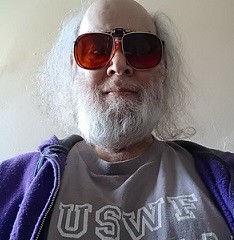Monday, December 23, 2019
What Might 2020 Bring for Tyson Fury, Deontay Wilder, and Anthony Joshua?
by Eddie Goldman
I was recently sidelined for a while with a nasty cold which made recording a podcast unrealistic. But during that time I finished up writing a magazine article which will be out very soon.
My analysis of the Dec. 7 Anthony Joshua-Andy Ruiz Jr. rematch will appear in the next issue of Ringside Seat, which will be issue number 9. It is scheduled to be released to subscribers this coming week. You can subscribe to this online magazine at Ringside Seat.
Also coming out very shortly is my article on the African Warriors Fighting Championship, which will be in the Feb./March 2020 edition of Black Belt magazine. I am told this issue is at the printers, so be on the lookout for it as well. You can also subscribe at Black Belt.
So if you are looking for a holiday gift, subscribe to both magazines. They also make perfect gifts for a family which fights!
As we approach 2020, there is still confusion and unclarity about what is next for the top three heavyweights: Tyson Fury, Deontay Wilder, and Anthony Joshua.
Predicting who will win heavyweight title fights may not be as hard as predicting when they will happen and which fighters will actually be fighting.
A year ago the heavyweight title agenda for 2019 seemed set in stone. In December 2018, Tyson Fury, who claims to be the lineal champion, and WBC champion Deontay Wilder fought to split draw in Los Angeles. This was a highly controversial verdict, like we seem to have in boxing just about every week. Most viewers thought that Fury had done enough to deserve a win, so a rematch was planned for May 2019. But in Feb. 2019, it was announced that Fury had signed a lucrative five-fight deal with ESPN in the U.S. and to be co-promoted by Bob Arum's Top Rank. Wilder's management is Al Haymon's PBC, which put the first fight on Showtime pay-per-view in the U.S. and now puts most of their big fights on Fox and Fox pay-per-view. It would not be easy to get these warring networks with their exclusive deals with fighters to do a joint pay-per-view. It has been possible in rare cases where the fights were tremendous draws, like Lennox Lewis vs. Mike Tyson in 2002 and Floyd Mayweather vs. Manny Pacquiao in 2015, where rival premium networks HBO and Showtime worked together. But by 2019, HBO had killed its boxing program and Showtime's was declining precipitously. The seasoned executives with these then-well-established boxing programs knew the business of boxing well enough to understand that these unusual arrangements would likely benefit everyone. But these ESPN and Fox deals were newer, with each struggling to make them profitable, and Fury and Wilder hardly were draws in the U.S. anywhere near the level that Lewis and Tyson were in 2002 and Mayweather and Pacquiao were in 2015. So the Fury-Wilder rematch was put on hold.
Instead, in 2019, Fury fought the unheralded opponents Tom Schwarz and then Otto Wallin. While on June 15 he demolished Schwarz in two rounds, his fight with Wallin on Sept. 14 took a dangerous turn as he was cut above his right eye in the third round. Fury managed to win a unanimous decision with Wallin unexpectedly going the distance. Plastic surgery followed for Fury, but by October Fury was back in a ring, of sorts, for an angle in the WWE, and performed in one of their shows in Saudi Arabia. That was his 2019.
For Wilder, he used the delay in the Fury rematch to fulfill his obligation to face his WBC mandatory challenger. That was Dominic Breazeale. After failed negotiations to fight on DAZN, Wilder returned to Showtime, reportedly with an improved deal. Wilder fought Breazeale on May 18, the date originally pencilled in for Fury-Wilder 2, and Wilder knocked him out in the first round. Next for Wilder was a rematch with Luis "King Kong" Ortiz on Nov. 23. For the first six rounds of this fight, Ortiz, who was in better shape than in their first fight in March 2018, outboxed Wilder. But in the seventh round, all it took was one punch from Wilder to knock out Ortiz. Supposedly Wilder would return to action just three months later, on Feb. 22, 2020, for the Fury rematch, which would reportedly be a joint ESPN-Fox pay-per-view in the U.S.
One month has now passed since Wilder's knockout of Ortiz, with Feb. 22 now being just two months away. As of this writing, on Sunday, Dec. 22, there has been no official announcement that Fury-Wilder 2 is taking place on that date. There have been no press tours announced, none of the usual canned training camp publicity issued, and no set schedule when all this will be finalized. And we have a couple of holiday weeks coming up where lots of things normally slow down.
There was one interesting discussion of note that did just take place about Fury-Wilder 2, although it took a bit of digging to come up with it.
On Saturday's BT Sport boxing telecast, after the main event of heavyweight prospect Daniel Dubois blowing out Kyotaro Fujimoto in the second round, Fury's co-promoter Frank Warren was asked about the Fury-Wilder rematch. And thanks to BT Sport for posting this on their Twitter page. Warren said that this fight will "definitely" take place on Feb. 22 and will "definitely" be announced this coming week. Next the announcer spoke with Tyson Fury's father, John Fury, who served four years in prison for gouging a man's eye out, and because of that criminal record is banned from coming to the U.S., even to see his son fight. John Fury said Tyson flew out on Wednesday to Las Vegas to train. But then he said that "the only way this fight won't take place is Wilder don't want it." The announcer quizzed him on that comment, but John Fury tried to clarify it by saying "this fight is most definitely happening, 100 percent" and his remark was merely "a figure of speech really." Whether this indicates problems in staging this fight on Feb. 22, or is just the type of common bad or confusing choice of words that happens during a live and unscripted interview, remains to be seen. We certainly should find out quite soon, as the clock is ticking.
Also curiously, that same night in the U.S. PBC had a live telecast on Fox. There were three entertaining fights and an interview with Errol Spence Jr., who is recovering from an auto accident. Spence said he plans to return to the ring in May or June. The main event saw Jermell Charlo recapture his WBC 154-pound belt by knocking out the fighter he had lost it to last year, Tony Harrison, in the 11th round. Charlo's twin brother Jermall, who fights at middleweight, was also interviewed, and he said he would return in May. It was a good, three-hour show.
But while many of PBC's upcoming fights were discussed on this show, nowhere seen or mentioned was Deontay Wilder or his rematch with Tyson Fury. So, this weekend before Christmas, not a creature was stirring, not even a PBC mouse, to come down our chimney for Fury-Wilder 2 to be announced. (That, I promise, is the last of mangling poetry for me, at least this year.)
Of course, this fight still could take place Feb. 22 and be announced this week. But that will give the organizers just two months to hype it, a time period which includes these two weeks of holidays and vacation for many, a possible impeachment trial, U.S. presidential primaries, and the Super Bowl on Feb. 2. There was a similar delay in early 2019 in announcing the rematch which had been slated for May. Whether or not anything as major as Fury signing with ESPN is holding this announcement up, valuable time has been lost, especially if the plans remain to put this on as a pay-per-view in the U.S. Neither fighter has drawn particularly well on the outmoded pay-per-views they have been on, and now two rival networks are being asked to jointly produce this one. Fury-Wilder 1 reportedly got only about 325,000 pay-per-view buys on Showtime, and Wilder-Ortiz 2 reportedly got in the range of 200,000 or so pay-per-view buys on Fox. Whether or not this sad reality is causing the network suits to hesitate going ahead with this joint pay-per-view is also unclear. But we shall see.
For Anthony Joshua, his 2019 was just as unpredictable, and his agenda for 2020 fuzzy as well.
After Joshua defeated Joseph Parker and Alexander Povetkin in 2018, his next fight was supposed to be a mega-show in the U.K. at Wembley Stadium in April. But Joshua was now aligned with DAZN, and their suits wanted him to fight in the U.S. next. In Feb. 2019, a June 1 date with the loquacious Jarrell "Big Baby" Miller was announced for Madison Square Garden. That, as you most assuredly know, was upended when it was revealed in April that Miller had failed three drug tests. Rather than cancelling the Garden show, especially since Joshua had not fought since the previous September, a replacement for Miller was found. And as you also most assuredly know, that replacement was Andy Ruiz Jr., who pulled the upset of the year by stopping Joshua in seven rounds and capturing his WBA, IBF, and WBO heavyweight belts.
Joshua had an immediate rematch clause with Ruiz, which he exercised, postponing plans for him to face his IBF mandatory Kubrat Pulev. Again, as you most assuredly know, the Joshua-Ruiz rematch took place December 7 in Saudi Arabia, with Joshua recapturing these heavyweight belts with a clearcut unanimous decision victory.
Now Joshua had to attend to his mandatories, and here, as often happens in boxing, it once again got complicated.
Pulev was supposed to fight Joshua in October 2017, but pulled out with an injury. He returned in October 2018 with a lackluster decision win over Hughie Fury, a cousin of Tyson Fury. Next for Pulev was a knockout win in March of 2019 over Bogdan Dinu. But after that fight, Pulev was seen during a video interview forcibly kissing female reporter Jennifer Ravalo on the lips. The California State Athletic Commission suspended Pulev's license and ordered him to attend sexual harassment prevention classes. Pulev's license was restored in July, and in November he defeated Rydell Booker, a 38-year-old journeyman who did not fight between 2004 and 2018 due to being in prison for over a decade. But Pulev's long status as the IBF heavyweight mandatory remained, and after Joshua regained his belts, the IBF ordered Joshua to fight Pulev next.
If only it were that simple.
The day before the IBF ordered Joshua to fight Pulev, the WBO ordered Joshua to fight their own mandatory, Oleksandr Usyk. Usyk, an unbeaten former undisputed cruiserweight champ, had only made his heavyweight debut in October, defeating another 38-year-old journeyman, Chazz Witherspoon. Somehow this earned him the WBO's mandatory spot at heavyweight.
But now Joshua was ordered by two separate sanctioning bodies to face two different opponents, or, presumably, be stripped of that belt. Assuming that Joshua would not fight both on the same night, this is a dilemma for Joshua, who just won his belts back and has long desired to become the undisputed heavyweight champion of the world.
Joshua's promoter Eddie Hearn has been vocal in asking these sanctioning bodies to come up with an order in which Joshua can face all these mandatories, and thus not be stripped of any of these belts. Such a move would not only be logical, but also in the petty self-interest of these sanctioning bodies, which collect fees based on what the fighters get in each fight.
If the WBO strips Joshua, a potential fight between, say, Usyk and WBO number two contender Joseph Parker would bring in only a fraction of what Joshua vs. Usyk would. Likewise, a fight between Pulev and IBF number three Adam Kownacki (the IBF number two ranking is vacant) would also hardly break any records.
Of course, either body could bend or break their own rules if Joshua were stripped, and have their mandatories face someone who was more notable, such as Tyson Fury, who was the IBF's number six before the Joshua-Ruiz rematch. Pulev and Fury are both co-promoted by Top Rank, so it would be an easy fight to make. And the WBO could dip down further into their ratings and have Usyk fight for their belt against their number four, a fellow named Andy Ruiz Jr.
Hearn, though, is still publicly and presumably privately lobbying for Joshua to be able to fight these mandatories one at a time and keep all his belts if he wins both fights. There may be a lot more to this behind the scenes, such as the marketability of Joshua vs. Pulev and Joshua vs. Usyk. It is likely Joshua returns to the U.K. in 2020, especially since he did not fight in his home country at all in 2019. Saudi Arabia has also expressed interest in bringing Joshua back, and they are raring to spend those petrodollars to make their country a world capital of sports. DAZN, which has largely built its subscriber base in the U.S. among boxing fans, would also want Joshua to return to the U.S. so his fight would take place on a late Saturday night in the U.S., rather than the afternoon U.S. time when they are held in the U.K. or Saudi Arabia. These types of considerations will play a far more decisive role in determining the next fights for Joshua.
So 2020 could still see Fury and Wilder fight two times in the U.S. on pay-per-view, and Joshua fight one mandatory after another. But 2019 did not go as planned for either of these three, and nothing guarantees it will go smoothly for them in 2020. If anything, boxing is more likely to move in an erratic direction in 2020, as all the sniveling warring fiefdoms plot against one another, often unaware that they are on a self-destructive path. In addition, what does take place in the fights themselves could alter whatever plans are made, such as a loss like Joshua had to Ruiz or an injury. And if the sanctioning bodies refuse to work together, and Joshua does get stripped of one of his belts even before he fights next, the result would be a further fragmentation of all these heavyweight titles. Heavyweight title unification will then become even farther away then it is now, all to the detriment of the fighters and fans.
It will take a lot of effort for anyone who manages to become the undisputed heavyweight champion of the world to rise to the level of popularity as undisputed heavyweight champions of old had achieved. Joshua has the most international appeal, but he is also the only one of these elite three to lose a fight by stoppage.
Will the action outside the ring stifle the action inside the ring in the heavyweight division, or will it finally facilitate a title unification? We shall soon find out, but if it does not go as you wish, let the lords of boxing know. Just don't be disappointed when they do what they want anyway.
(Photo of Anthony Joshua by Mark Robinson/Matchroom Boxing. Photo of Deontay Wilder vs. Tyson Fury by Esther Lin/Showtime.)
Labels: Anthony Joshua, Deontay Wilder, Eddie Goldman, heavyweight boxing, No Holds Barred, Tyson Fury
Comments:
Post a Comment
1 Comments:
Boxing never misses an opportunity to miss an opportunity.
1 comments Tweet
















